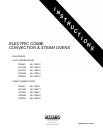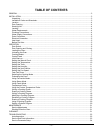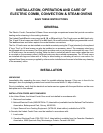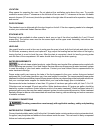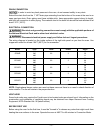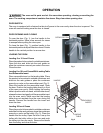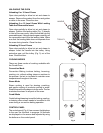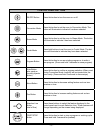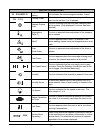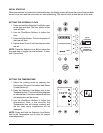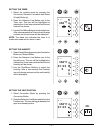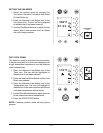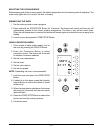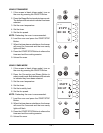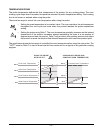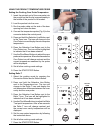
– 4 –
LOCATION
Allow space for operating the oven. Do not obstruct the ventilation ports above the oven. To provide
ventilation access, allow 1" clearance on the left side of the oven and 2
1
/2" clearance at the rear. A suitable
amount of space (18" minimum) should be provided on the right side of the machine for operation, cleaning
and service.
DOOR OPENING
The standard oven is delivered with the door hinged on the left. If the door opening needs to be changed,
contact your authorized Hobart Service offi ce.
STACKING KITS
Stacking kits are available to allow ovens to stack, one on top of the other (available for 6 and 10 level
ovens only). The bottom oven must be the same depth as the upper oven. Assembly Instructions are
included with the kit.
LEVELING
Use a spirit level on a rack in the oven to make sure the oven is level, both front-to-back and side-to-side.
On 20 levels, accessory stands, and optional 6" legs, adjust the leveling feet on the bottom of the legs by
turning the feet in or out to level the oven. After the drain is connected, check for level by pouring water
onto the fl oor of the compartment. All water should drain through the drain opening.
WATER REQUIREMENTS
As with all steam related products, water fi ltration and regular fi lter replacements coupled with
routine deliming are required. Your local Hobart Service offi ce can recommend a water treatment system
to meet the needs of your local water conditions. Contact your local Hobart Service representative for
water treatment offerings.
Proper water quality can improve the taste of the food prepared in the oven, reduce liming and extend
equipment life. Local water conditions vary from one location to another. The recommended proper water
treatment for effective and effi cient use of this equipment will also vary depending on the local water conditions.
Ask your municipal water supplier for details about your local water supply prior to installation.
Recommended water hardness is less than 5.0 grains of hardness per gallon with pH from 7.0 to 8.0.
Chlorides must not exceed 30 parts per million. Water hardness above 6.0 grains per gallon should be
treated by a water conditioner (water softener and/or in-line water treatment). Water hardness below 4.0
grains per gallon may also require a water treatment system to reduce potential corrosion. Water treatment
has been shown to reduce costs associated with machine cleaning, reduce deliming and reduce corrosion
of metallic surfaces.
PLUMBING CONNECTIONS
Plumbing connections must comply with applicable sanitary, safety and plumbing
codes.
WATER SUPPLY CONNECTIONS
Connect treated potable water (cold) to the inlet. Untreated water contains scale producing minerals which,
if supplied, can precipitate and adhere to the surfaces inside the oven. This can result in early component
failure and reduced product life.



